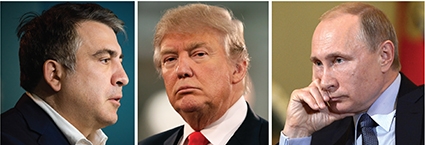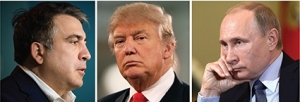Saakashvili, Trump & the Breakup of the UNM
OP-ED
The Georgia Analysis is a twice monthly analysis of political and other major developments in Georgia by Lincoln Mitchell, a political development, research and strategic consultant who has worked extensively in the post-Soviet region.
The continued breakup of the United National Movement (UNM) should not be a big surprise to anybody who has been paying attention to Georgian politics over the last four or five years. Political parties that lose four consecutive elections, in this case two for parliament, one presidential and one local election, rarely hold together. This is particularly true in countries like Georgia where almost all political parties are relatively new. The big question facing the post-UNM party led by former UNM stalwarts David Bakradze, Gigi Ugulava and Giga Bokeria, is whether it is too little, too late. Those three leaders, as all sentient Georgian voters know, have been leaders of the UNM for around a decade. It is not clear whether they will be able to successfully rebrand their new party or simply be seen as old wine in new, albeit Saakashvhili free, bottles.
It has been the case for at least a few years that the UNM, even under a new name and following a split of some kind, will only thrive if it separates itself from its former leader, who remains able to command some foreign attention but is far from beloved in Georgia. Presumably because of Saakashvili’s widespread appeal and power within the party, it took many others in the UNM leadership longer to figure this out than they might have. Once they did, however, it became very clear to them that political survival for them was impossible unless they separated themselves from their party’s erstwhile leader.
The separation that the breakaway faction, which is, importantly, larger than what is left of the UNM, was not easy, or friendly. Ugulava’s comment that Saakashvili “does not radiate leadership anymore,” was one of the nicer things he said about his party’s founder and longtime leader. Saakashvili’s response was also telling. He noted that Ugulava spent more time attacking Saakashvili than Bidzina Ivanishvili, the founder of the ruling Georgian Dream (GD) party that Saakashvili has long demonized as the real leader of Georgia and a Russian stooge, had. Saakashvili also added that period of “losers governance” within the UNM was over because Bokeria, Bakradze and Ugulava had left.
First, while such comments are another reminder of Saakashvili’s fixation on Ivanishvili, a sentiment that may well be mutual, they also represent an appalling lack of self-awareness. While Bakradze, Ugulava and Bokeria, and those who have followed them out of the UNM, may not be extraordinary politicians or vote-getters, if there is one person who is responsible for the recent electoral defeats suffered by the UNM, it is Saakashvili, the man most identified with the party. It will be difficult for these politicians, who for so long were seen as Saakashvili’s loyal lieutenants, to craft a new party that is not dogged by the Saakashvili legacy, but it is apparent that this is the task they have created for themselves.
The question of where Saakashvili goes from here is more difficult to answer, but it is also very important for Georgia’s future. This is further complicated because Saakashvili’s future in his recently adopted country of Ukraine is also unclear. He resigned as governor of Odessa late last year, but remains involved in Ukrainian politics where he has formed his own political party and positioned himself as a kind of anti-corruption advocate at large. It is yet to be seen whether the Ukrainian electorate shares this image of the former Georgian President and Odessa governor.
One hint of how Saakashvili may seek to position himself can be seen in some thoughts he posted on Facebook on January 11th. The post is lengthy, but worth quoting in full.
“President-elect Trump visited Georgia on a business trip (in 2012). During this trip and during my visits to see him in New York, I've been with him in different situations of social interaction. I can confirm that while he is a very interesting and impressive personality, who is fun to be with, he is also a very dignified and careful man and I cannot imagine him finding himself in a situation when his actions could be used against him by the likes of Putin. I believe that the whole thing is a classic example of black PR and I am speaking of it from my personal experience as they've used plenty such dirty tricks for many years against me, too.”
Saakashvili is trying to do the seemingly impossible task not just of defending Donald Trump from charges that intervention on the part of Russia and Vladimir Putin helped get him elected, but to also suggest that the entire Trump-Putin saga is something that is the product of dirty tricks by Trump’s opponents. It is not clear from his comments whether the former Georgian President believes Russia, the Democratic Party or both are the dirty tricksters in this scenario. This reflects Saakashvili’s need to continue to present himself as a leading anti-Putin voice, while also seeking to curry favor with the new American President.
Saakashvili’s description of Trump has some truth to it. The new American president is interesting, and perhaps for somebody like Saakashvili, fun to be with. However, other than his widely known germaphobia, Trump is anything but careful; and by now most Americans could think of hundreds of adjectives that come to mind before the word “dignified” to describe their new leader.
Saakashvili’s motivation here is that his best gambit for remaining relevant in Georgia is to present himself as having a special relationship with Donald Trump. However, this will be of no value to Saakashvili if Trump continues to be tainted by the broad perception that Trump, not Ivanishvili or any of Saakashvili’s critics or political opponents, is the real Russian stooge.
Notably, there is little evidence that Saakashvili, despite his one-time friendship with Trump, has had much contact with anybody on the incoming Trump administration, or that anybody in that administration has given the former Georgian President and former governor of Odessa much thought. That creates a major problem for Saakashvili because he has already compromised his calling card, his outspoken opposition to Putin, by being apologist for somebody who is widely suspected of having an inappropriate political relationship with Putin.
This may mean nothing for Georgia. Perhaps with no political base other than a much-weakened rump UNM, Saakashvili will internalize the reality that his moment in Georgian history has come and gone, but there is no guarantee that will happen. If it doesn’t, Saakashvili could be a force of great uncertainty for Georgia. In his efforts to reinsert himself into Georgian politics, Saakashvili could continue to cultivate his relationship with Trump, who is very susceptible to flattery and more or less understands foreign policy, and politics more generally, through the lens of who says nice things about him and who does not; and Saakashvili certainly understands that.
The goal of Saakashvili’s effort to flatter the American President is to make Saakashvili a player again, something that is eased by the pre-existing relationship between the two men. If that happens, Georgia can hope that Saakashvili uses that relationship to help Trump arrive at a different position on Putin, but Saakashvili would also use that relationship to frame Trump’s understanding of Georgian politics. That understanding would place Saakashvili as the shining beacon of hope for Georgia. That understanding, if it became the foundation for American policy on Georgia, would be a disaster for Georgia, and a problem for the US as well. It could lead to American suspicion of the current Georgian government, to Saakashvili’s view that the government of Georgia is anti-democratic and illegitimate gaining more traction in the US or even support for the belief that there is a desire in Georgia for Saakashvili to return to a leadership role.
As Bokeria, Bakradze, Ugulava and others seek to create a new political force in Georgia- one with the pro-west orientation of the UNM, but without its political baggage, a task made all the more difficult because those three have been carrying much of that baggage for many years -they will do so in a changing Georgian, and global political context. Saakashvili, for his part, will continue to try to find his place in both settings. It is not always useful to speculate too much about Saakashvili, or any other politician, but the breakup of the UNM heralds a new chapter in Georgia’s political party development, and because he was a critical cause of that breakup, of Saakashvili’s career as well. We also know that simply slipping off into obscurity is something Saakashvili has never been able to do.
Read more on lincolnmitchell.com
Lincoln Mitchell












